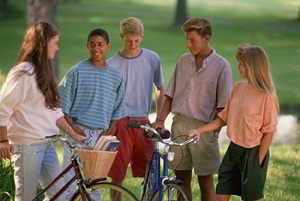Teaching Gifted Learners: Building Social Skills
Posted by PLB · 2 Comments

 A majority of gifted children struggle with socializing. Interacting with family, school, and peers present external elements that can factor into significant challenges for gifted students. Our responsibility as educators, therefore, includes teaching gifted learners and developing social skills in them.
A majority of gifted children struggle with socializing. Interacting with family, school, and peers present external elements that can factor into significant challenges for gifted students. Our responsibility as educators, therefore, includes teaching gifted learners and developing social skills in them.
As with all children, family dynamics are most critical to the healthy development of a gifted child. Environments ripe with permissiveness, neglect or excessive strictness can hinder the process of teaching gifted learners.
In a school setting, the placement of a gifted child in a regular classroom often results in the student feeling frustrated, bored and rejected. Sometimes their healthy work ethic disintegrates and disappears altogether when it becomes apparent to them that they are not developing academically. In other words, when there is hardly any challenge, the opportunity for intellectual growth is limited.
Some gifted children have advanced perceptions of friendship and from an early age seek out companions who are older. Others may conceal their advanced abilities from their peers in order to avoid being bullied and to seem more “average.”
Social pressures to “fit in” are real. “Gifted” students in middle and secondary schools are aware of their uniqueness and will often work hard to play down their abilities in order to not stand-out from their peer group.
How can we, as educators, help gifted learners develop social skills and interact with their peers?
From Professional Learning Board’s online continuing education course for teachers: Differentiation for Gifted Learners in the Classroom




In my opinion, teaching gifted students is the hardest challenge of teaching. Having been a teacher for over 35 years, it is hardest to keep the gifted students engaged, challenged, and create collaborations of flexible groupings that work. My own daughter is gifted, truly 1% at the top, and her childhood was not easy. She was often frustrated because in elementary school, the teachers did not know what to do with her. A first grade teacher gave her double readings and double workbooks instead of posing probing questions for one book that would help her use the critical thinking skills she already had. My daughter would solve 300 piece puzzles at home, and pretend not to know how to do them at pre-school. By the fireplace at home, she would write the most amazing poems, and not write at school. Teachers were accusing me of pressuring her because she was underperforming at school. By second grade, I was told to send her to private school. My daughter did not have the social skills to read others. She was bullied and stayed at the top of the jungle gym to avoid the bullies until her hands were raw. At that time, there were no social curriculums in school to help students maintain eye contact. By fifth grade, after much heartache, I transferred her to an all-girls private school with brilliant teachers who would know how to engage her. My daughter started performing academically, but she still had the lack of social skills to gain friends and be part of a crowd. She wanted so badly to be popular. My heart would ache. My daughter would look at others who cried over the mark of B+, and feel ashamed for them. She made it her mantra to have a life, other than trying to get all A’s to go to Harvard. The best friends my daughter had were horses and animals. As she grew older, other people marveled at her wit, her brilliance, and her depth of caring. Being gifted is a hard road for the top 1% who are. There is a depth of understanding at a young age that is misunderstood by the developmental age of others. Gifted kids are alone in their thoughts. They are different. Only when they are adults and are truly appreciated, do they begin to relax…
Marcy,
Surely you have encountered people who say, “I know how you feel … I understand …” about almost any topic. And some of the time, they really might not.
But I DO empathize, and I DO understand your story because I have a daughter who has had similar struggles. Her friend was music, and she became an accomplished flautist. I think there were many times that she would have traded her talents for a good, giggly girlfriend, however.
Our daughters are lucky to have had us as strong advocates. Lots of highly capable kids are never identified. With all the emphasis on RtI, don’t you think the model should be diamond-shaped? There should be a point at the top for the kids who are entitled to challenge – with excellent resources based on current research – for THEM made available, as well.